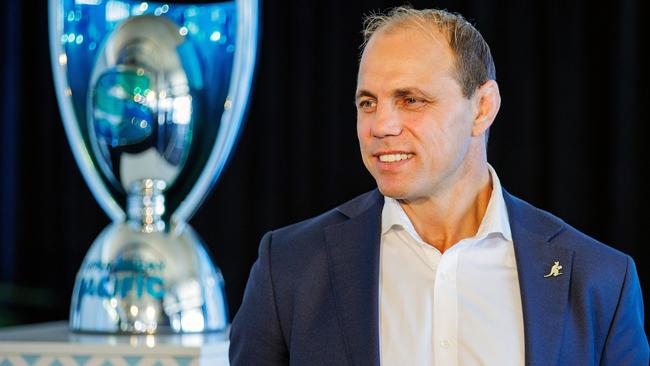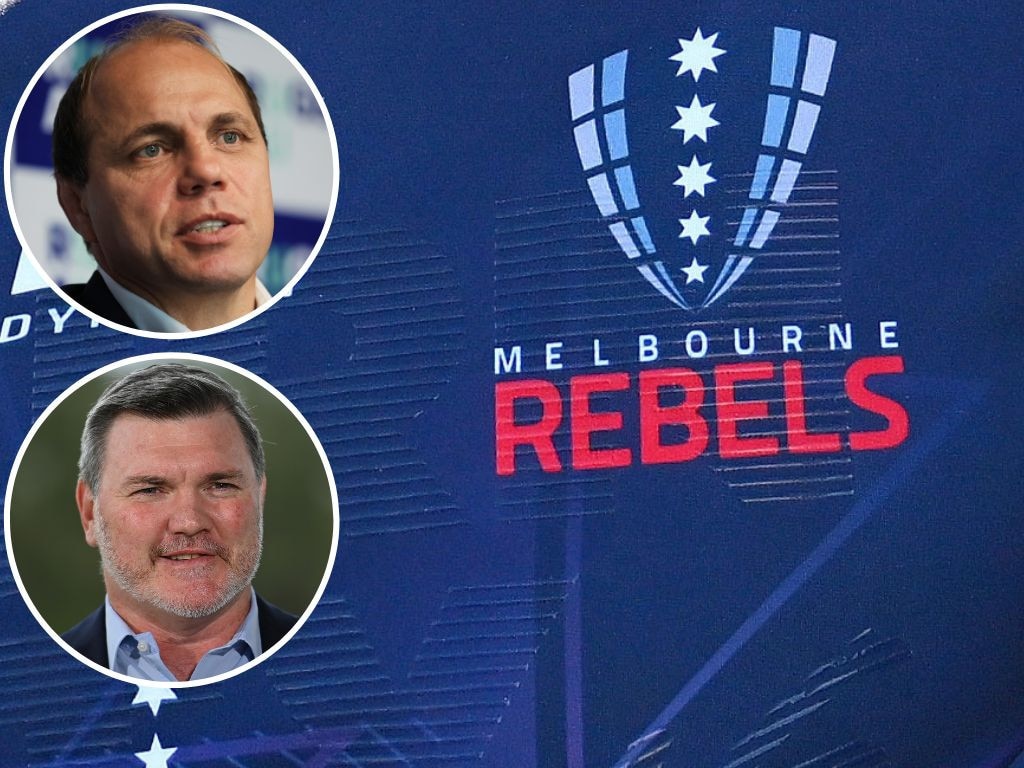RA CEO: hopes not to pay ‘market rate’ for star Wallabies – retain on new culture alone
RA chief Phil Waugh has outlined his plans to keep talented players in Super Rugby, and in turn spurn cashed-up foreign clubs.

Rugby Australia CEO Phil Waugh maintains a strengthened Wallabies culture will keep talented footballers playing Super Rugby and trump the lure of dollars offered by cashed-up foreign clubs and rival codes.
The Weekend Australian last week revealed French Top 14 and UK premiership rugby clubs were quickly on the phone to player agents seeking to capitalise on the Melbourne Rebels going into voluntary administration.
It’s understood Rebels and Wallabies tighthead prop Taniela Tupou is already attracting informal interest north of $1.5m a season from Europe for his talents.
It’s also hard to ignore the financial squeeze that will be on Rugby Australia head office with NRL Sydney Roosters star Joseph Sua'ali'i due to start his monster $5m deal later this year.
But Waugh said the key to keeping the big names and players in general in Australia will create a Wallabies’ environment – now led by new coach Joe Schmidt – that it will be hard for a local footballer to turn their back on as well as becoming more “fiscally responsible”.
“I think, again, it’s about being fiscally responsible and living within our means within the Australian market,” Waugh said. “I’m not talking about Taniela, alone – I’m talking about contracting players at those higher levels, we need to ensure that we are fiscally responsible and that we set the game up financially going forward.”
“And then I think it comes back to that piece around the Wallaby environment and culture – the success of the Wallabies – and that our players are desperate to be a part of it …(we hope) that goes a long way to hopefully not having to pay at a market rate that’s competing with the big dollars in France or in Japan, because you’re actually creating a culture, an environment where players want to be a part of and will sacrifice elements of other opportunities to be a part of it.”
“I do genuinely believe that culture that you create in the game goes a long way to keeping players – similar to what New Zealand have done for a long period of time and Ireland doing that now. I think the fact they are keeping players in their country for less than what they would otherwise got offshore, that’s because of the environments that they’ve created.”
From the Melbourne Rebels’ financial implosion came their claim this week the likes of Waugh and chair Dan Herbert should be liable for the Super Rugby clubs who have a $11.6 million tax debt.
Waugh told The Weekend Australian a “claim” among other burning matters sparked by the Melbourne club going into voluntary administration has been a focus of many Rugby Australia board meetings this week.
“If you’ve read through the minutes of the creditors’ meeting … there are claims, which are exactly that,” Waugh said. “We’ll work through all of that, within the process of administration, and clearly the processes after that, depending on the direction that both our advisers and legal teams are working through.”
“We are very, very diligent and disciplined in ensuring that we address and pay all our obligations on time and to the dollar … that’s a very strong stance that we have.”
The same could not be said for the Melbourne Rebels board members, who each received Director Penalty Notices in late November, which gave them 21 days to pay the tax or put the club into voluntary administration.
They didn’t pay the notices and the Rebels board members are now at risk of losing their homes over a $11.6 million tax debt. The Australian Taxation Office has made the seven board members personally liable for the club’s debt – or $1.65 million each – which they are now trying to shift on to RA directors.
There is a chance this could head to the courts, with the potential to ignite a bigger legal battle than the $4 million Israel Folau settlement. The Herald Sun reported the Rebels board are determined to head to court and demand that Rugby Australia, which is listed on player contracts, pays up to $8 million.
It’s just six days away from the Super Rugby season and Waugh is dealing with creditors’ reports, legal threats and crisis meetings. The RA chief executive is trying to steer the game out of a world of financial pain and into what was supposed to be a “golden decade” for the game with home World Cups in 2027 (men) and 2029 (women).
Waugh met with Rebels employees on Thursday, including the high-performance staff who, despite the state of the club, were feeling positive about the season to come, Waugh said. Pundits say the Rebels are well in the mix to win the Super title.
“They were all feeling like they’ve got the team in a really strong position to be successful in ’24,” Waugh said.
He added: “I’m going to be as transparent as I can be and push as much integrity into the system as I can by actually giving answers I can give answers to, and equally, if I don’t have answers I’ll just be transparent around the fact I don’t have answers.”
Waugh was in Auckland this week for the Super Rugby launch and then on a plane to Melbourne, where he met with staff and players just hours after Rebels CEO Baden Stephenson was made redundant.
While there is more talk about finances than football around the launch of the Super Rugby season, Waugh says a light at the end of a dark tunnel. He says he is “optimistic” around what Australian Super Rugby teams can be.
“I think that right now we’re an underperforming product in the market … I think the more that we can compete with the New Zealanders, the more integrity it puts into the system,” Waugh said.
“I’m still fairly optimistic about the fact we do have some of the best rugby players in the world and athletes in the world playing in our tournament. I think then it’s about keeping players on the field and the Australian teams performing better than what we have historically.”
“I do watch a lot of rugby in the northern hemisphere – and we have a good game here. When we execute the laws and play to the level we should be playing, the provincial game is as good as anywhere in the world. I’m pretty optimistic around what we can be.”
When asked to reflect on why Rugby Australia, with an $80m loan, is in the state it is, Waugh believes “disconnect” has a lot to do with it.
As other codes, particularly the NRL, has bolted away to billion-dollar TV deals, rugby’s popularity has declined.
“I think the lack of connection, the loss of vision and recognition that the game is owned by the community (led the game’s demise here),” Waugh said.
“One of the greatest strengths of our game is we endeavour to be the beating heart of local communities. And in some areas of the country, that’s exactly where we are.
“But I do think there’s been a lack of connection to the community. And that’s certainly the most important element we need to get right. Do I think that we can get it right? Absolutely.
“I’m confident we can turn it around.”








To join the conversation, please log in. Don't have an account? Register
Join the conversation, you are commenting as Logout